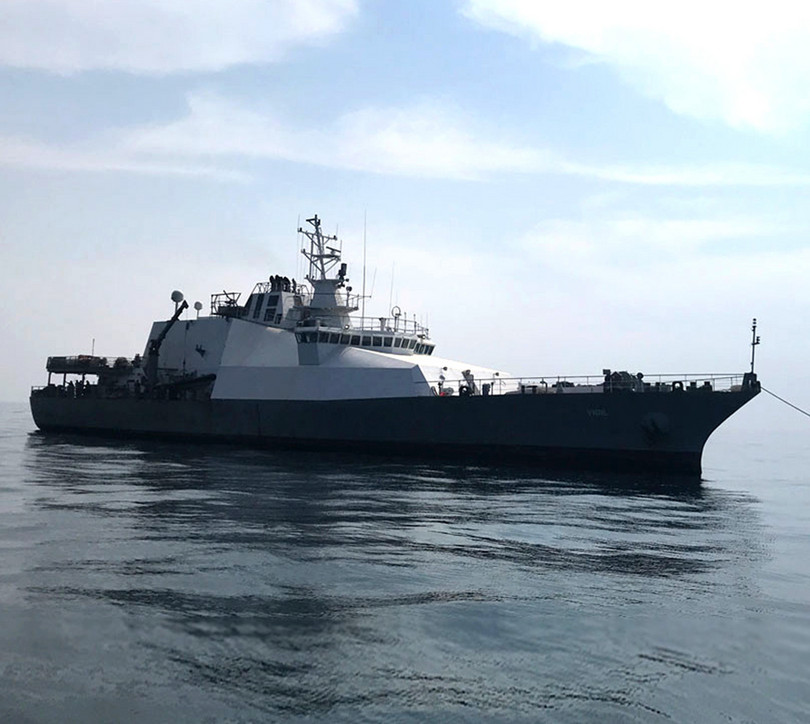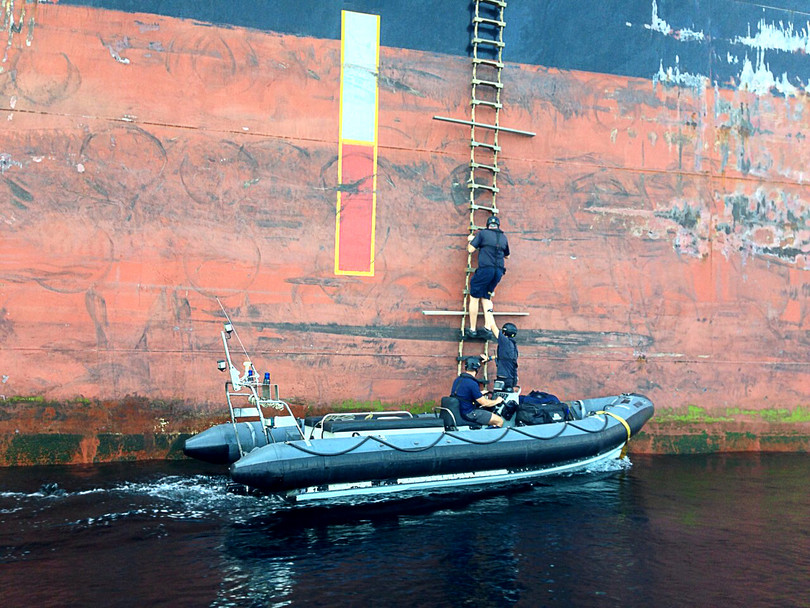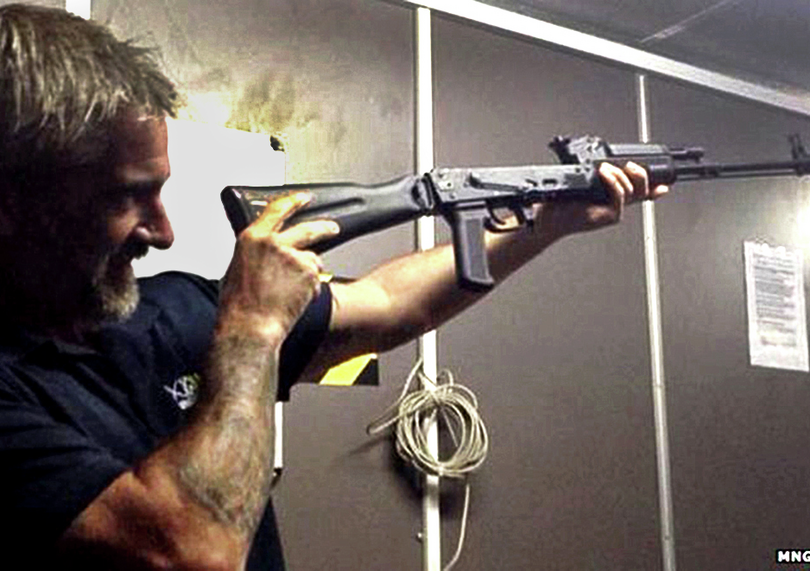Floating armouries in the western Indian Ocean: new trends in the modern maritime-security landscape.

This vessel, the MNG Pembroke, is operated as a floating armoury by MNG maritime, moored in international waters to operate as a base for armed guards and weapons.
Photo: MNG Maritime

Small transfer vessels are used to trans-ship weapons from the armoury to merchant ships.
Photo: MNG Maritime

Small transfer vessels are used to trans-ship weapons from the armoury to merchant ships.
Photo: MNG Maritime
At the height of Somali piracy around 2011, shipping companies took the unprecedented step of placing armed security on vessels transiting the Gulf of Aden and the western Indian Ocean, reaching down to the East African coast.1 Floating armouries housing guards and weapons in international waters also arose to resolve the legal difficulties of landing vessels with weapons on board. This shift in policy led to a proliferation of private maritime-security companies (PMSCs) operating in the region.
Today, these PMSCs work under very different circumstances: a decline in the number of piracy incidents has driven down prices, leading some in the business to raise concerns about safety standards among operators. Yet, these armouries and the guarding companies that use them continue to operate in a sparsely regulated legal space.
Origins
The deployment of armed guards on ships transiting the Indian Ocean as a response to piracy was a significant policy shift. ‘Initially, there was no armed security,’ explains Neil Roberts, head of Marine Underwriting at Lloyd’s Market Association. ‘But it became clear that that was part of the answer, because the armed forces [in the region around Somalia] simply couldn’t provide support to the extent the ship owners needed.’2
The ability to sail through the western Indian Ocean, rather than around the Cape of Good Hope, saved shipping companies weeks in travel time. This, in turn, gave rise to the need for ‘floating armouries’: ships stationed semi-permanently in international waters, acting as a base for security guards and the arms picked up and dropped off by vessels passing through high-risk areas.3
Floating armouries provide PMSCs with a solution to the legal difficulties in deploying private security.4 Bringing vessels into port with arms on board is not legal in many countries: some states also have differing interpretations as to how armed teams are viewed legally in territorial waters. However, in international waters, where no national jurisdiction applies, taking an armed team aboard is purely the decision of the ship owner and insurer.5
Legal frameworks
Today, there are four leading operators of floating armouries: two British companies, one Spanish-run company registered in Panama and one run by a Yemeni national operating from Dubai. 6 There are also between 50 and 90 PMSCs that provide the guards hosted on the armoury platforms.7
Yet, there is little by way of international regulation of these businesses. Few laws, if any, deal specifically with the armouries themselves – for example, there is no centralized international registration of armouries or the weapons they carry, or a distinct legal status for them – though some national and international instruments do apply to them.8
It is primarily up to individual countries to regulate security companies registered in their jurisdiction. ‘This industry operates in such a grey area,’ said a contractor currently stationed on a floating armoury and speaking on condition of anonymity. ‘If it gets too much attention, the whole industry will collapse under pressure. The armouries operate in international waters, but the companies are registered in various countries. Those countries put pressure on the PMSC’s to follow certain rules. That has an effect on us, having to get our ducks in a row.’9
Mark Gray, founder and co-director of MNG Maritime, a UK-based provider of floating armouries, describes how this national ‘pressure’ is manifested. ‘We have a UK-government license for all of our armouries. They audit us every year, come in and take records, and they state very clearly what records we have to keep so we can keep serial numbers of the weapons that we move. Which ship we put them on, when we put them on, and who’s taking them over, all that sort of thing. So, it’s a very comprehensive system. It is not wholly ungoverned as you’d imagine.’10
However, Gray and several others suggested that the same level of standards are not required of companies registered in many other jurisdictions. ‘Floating armouries are such a niche issue and there are so few of them that I doubt anyone would want to put the time into developing a dedicated legal regime for them,’ commented Cole. ‘Many ships carry firearms for protection and would not want to have to report the fact to coastal states nor declare the fact more widely. So, the shipping industry would resist regulation of [floating armouries], especially if it might impinge on the freedom of navigation of other shipping that carried weapons and guards.’11
Price drop and decline in standards
The state of piracy off the East African coast is very different today. So far this year, there have been only two attacks on vessels in the high-risk area – both related to the conflict in Yemen rather than piracy – compared to 168 incidents in 2012.12 Roberts described how, over the years, it became a truism in the business to say that no ship had been captured by pirates when it had armed security on board.13
In a way, these companies have become the victims of their own success. According to Gray, ‘the take-up of armed security teams as a whole has been in steady decline, probably since about 2013 … if you’re a ship owner and there’s barely been a successful act of piracy since 2013, you’re probably imagining the problem has gone away. And to a certain extent, that’s true.’14
Decline in demand has, in turn, driven down prices. Philip Diacon, CEO of Dryad Global, reported that around 2007–2010, providers could charge approximately US$50 000 for a 10-day transit with a team of four experienced (usually western ex-military) personnel. In 2020 (pre-pandemic), rates for the same work were along the range of US$5 000–8 000.15
Many in the industry are concerned that low prices have driven down safety standards, particularly among armoury and security companies that are less stringently regulated by their national authorities.16 This manifests in poor working conditions on board – from late pay to cramped environments.17
According to Marc van Wieringen, a security consultant who worked for several years as an armed guard on vessels before managing a floating armoury, as the market has deflated, the quality of the personnel guarding ships has ‘dropped drastically’. Several interviewees raised concerns that guards employed by some PMSCs simply don’t have sufficient training to handle the weapons they are being employed to use.18
COVID-19 challenges
The pandemic has heightened pressure on an already pressurized industry. The closure of many ports cut off the regular embarkation and disembarkation points for guards. This caused difficulties in bringing supplies to floating armouries, and personnel – usually deployed for around two months – were unable to return home for far longer than envisaged.19 As global shipping slowed in the pandemic, guards deployed to protect ships were then shifted to the armouries, adding to pre-existing overcrowding issues. Burnout became a significant problem.20
Diacon argued that the increased pressure on vessels heightens the risk of personnel taking ‘desperate actions’.21 In one case in August this year, a Ukrainian guard working for Alphard, a PMSC, broke into the weapons store onboard a floating armoury operated by Palm Charters, the Spanish-based provider, and took the crew hostage in a dispute over back pay. A similar incident, involving the same guard, also took place in July. The guard had been stuck at sea for over five months, reportedly without pay.22
Another issue is the risk of COVID-19 infections. Naturally, a small vessel with up to 150 people on board, constantly exchanging personnel with other vessels, is a high-risk scenario. As Gray described, an outbreak on board an armoury is their greatest fear. ‘Once it’s on a platform, it’s going to run through like you wouldn’t believe. I guess we’d have to quarantine the ship for two weeks. And that would be fatal for business.’23 Measures taken by MNG Maritime, such as thermal-scanning cameras taking the temperature of all those on board multiple times a day, and only allowing people on the armoury who have been at sea for seven days without exhibiting signs of the disease, have so far avoided this eventuality.
Potential deployment to Northern Mozambique
Given the turmoil caused in the market by declining prices and COVID-19, and the ongoing questions surrounding the regulation and standards of some companies operating in this space, it is also worth considering the latest theatre of operations in East Africa, in which some of these companies may soon become involved.
The conflict in northern Mozambique has escalated drastically in recent months, as insurgents have taken control of the port town of Mocimboa da Praia. At the same time, the development of oil and gas in the region by a consortium of companies led by the French company Total Inc. continues to drive ahead,24 with the first gas expected to be extracted within weeks.25
A security consultant working with the gas companies and their financial backers on analyzing the risk in northern Mozambique said serious consideration is now being given to the idea of bringing in maritime security.26 Other interviewees were also of the view that the oil companies are on the cusp of tendering large contracts for protection of offshore oil platforms, and some of the same companies currently providing armed maritime security on vessels will also be bidding for this work.27
While some in the industry argued that PMSCs would stay within their usual sphere of operations – the high seas – it seems that some providers would be prepared to venture into work in territorial waters or on land.28 Gray argued that most of the ‘reputable’ companies would steer clear of engaging in contracts to provide security on land, and most would keep focus on the protection of oil and gas platforms. But, he said, ‘of course like in any other activity you have high-quality, reputable companies, and at the bottom end you’ve got low-quality, disreputable, illegal, happy-go-lucky, try- anything kind of cowboys. And I certainly can’t speak for that whole spectrum. But the type of clients we have would not want to get involved in anything like a civil war or internal conflict, or anything on land: for the most part they protect the ships, protect the platforms.’29
In the view of US-based conflict, journalist Robert Young Pelton, who writes widely on the use of private military contractors, said that the potential for violent confrontations between security contractors protecting oil rigs and any insurgent groups poses the risk of exacerbating the conflict. In Pelton’s view, unsuccessful previous private military operations on land in Northern Mozambique in late 2019 and early 2020 have aggrav- ated the situation and demonstrate the risks of mercenary deployment.30 These operations have not only been unsuccessful – Russian mercenaries from the company Wagner Group were forced to withdraw,31 and a helicopter belonging to South African company Dyck Advisory Group was shot down by insurgents – but have also been accused of causing civilian casualties.32
Notes
-
Denys Reva, Ten years on, is Somali Piracy still a threat? ISS Today, Institute for Security Studies, 7 November 2018, https://issafrica.org/iss-today/ten-years-on-is-somali-piracy-still-a-threat; World Bank, The Pirates of Somalia: Ending the Threat, Rebuilding a Nation, April 2013, https://www.worldbank.org/en/news/feature/2013/04/11/ending-somali-piracy-go-after-the-system-not-just-the-pirates. ↩
-
Interview with Neil Roberts, head of Marine Underwriting at Lloyd’s Market Association, 1 October 2020, by phone. ↩
-
PortandTerminal.com, Floating armouries: The ships full of guns for hire against pirates, 16 November 2019, https://www.portandterminal.com/floating-armouries-the-ships-full-of-guns-for-hire-against-pirates/. ↩
-
Dryad Global, Hiring ship security personnel and armed guards – what you need to know, 13 September 2020, https://channel16.dryadglobal.com/hiring-ship-security-personnel-and-armed-guards-what-you-need-to-know. ↩
-
Interview with Philip Diacon, CEO of Dryad Global, 7 October 2020, by email. ↩
-
Interview with Mark Gray, co-director of MNG Maritime, 8 October 2020, by phone. ↩
-
Interview with Marc van Wieringen, security consultant, 15 October 2020, by phone, who estimated there are around 50 companies currently operational; interview with Mark Gray, co-director of MNG Maritime, 8 October 2020, by phone, who estimated 80 to 90. This is reportedly far fewer than in previous years, as many companies have either amalgamated or been forced out of the business. ↩
-
UNODC Global Maritime Crime Programme, Maritime crime: a manual for criminal justice practitioners, Annex A: Summary of laws regulating floating armouries and their operations, August 2020, https://www.unodc.org/unodc/en/piracy/manual-and-annexes.html. ↩
-
Statement from a current employee on a floating armoury in the western Indian Ocean, 15 October 2020, by WhatsApp. ↩
-
Interview with Mark Gray, 8 October 2020, by phone. ↩
-
Information shared by Alan Cole, head of the UNODC Global Maritime Crime Programme, by email, 6 October 2020. ↩
-
Interview with Philip Diacon, 7 October 2020, by email. ↩
-
Interview with Neil Roberts, 1 October 2020, by phone. Roberts reported that there may be one exception to this truism: an Iranian dhow captured by pirates with armed security on board. ↩
-
Interview with Mark Gray, 8 October 2020, by phone. Roberts estimated that between 40 and 50 per cent of vessel transiting the ‘high risk area’ currently carry armed security, while Gray estimated between 25 and 30 per cent. ↩
-
Interview with Philip Diacon, 7 October 2020, by email; Van Wieringen gave another example of the depression of prices: ‘To give a monetary example, when I first started in 2012 a ‘transfer’ as we call it – in other words, from armoury to mothership – was in the region of USD$8 000 for the transfer of a team and equipment. Currently, it’s less than USD$1 000 for the same operation. The average price is probably at about USD$1 200,’ interview with Marc van Wieringen, 15 October 2020, by phone. ↩
-
Dryad Global, Hiring ship security personnel and armed guards – what you need to know, 13 September 2020, https://channel16.dryadglobal.com/hiring-ship-security-personnel-and-armed-guards-what-you-need-to-know. When asked about what had brought about the poor practices Dryad warned about in their analysis, Diacon reported: ‘As new entrants followed the money, prices started to be eroded; a process that inevitably led to many PMSCs moving away from employing their own guards and using contractor models and ever cheaper options. It is now standard practice for shipping operators to use 3 person rather than 4-person team [as per industry guidelines] to save costs,’ interview with Philip Diacon, 7 October 2020, by email. ↩
-
Interview with Philip Diacon, 7 October 2020, by email. ↩
-
Interview with Mark Gray, 8 October 2020, by phone; Interview with Marc van Wieringen, 15 October 2020, by phone. ↩
-
Interview with Marc van Wieringen, 15 October 2020, by phone; Interview with Mark Gray, 8 October 2020, by phone; Interview with Philip Diacon, 7 October 2020, by email. ↩
-
Interview with Marc van Wieringen, 15 October 2020, by phone. ↩
-
Interview with Philip Diacon, 7 October 2020, by email. ↩
-
Dryad Global, Hiring ship security personnel and armed guards – what you need to know, 13 September 2020, https://channel16.dryadglobal.com/hiring-ship-security-personnel-and-armed-guards-what-you-need-to-know. ↩
-
Interview with Mark Gray, 8 October 2020, by phone. ↩
-
António Tiua, Mozambique LNG: Consortium led by Total has already signed all financing contracts – O País, Club of Mozambique, 3 July 2020, https://clubofmozambique.com/news/mozambique-lng-consortium-led-by-total-has-already-signed-all-financing-contracts-o-pais-164769/. ↩
-
Interview with a private security consultant working with oil and gas companies in northern Mozambique, who chose to remain anonymous, 12 October 2020. ↩
-
Ibid. Reportedly, the insurgents have begun to use captured boats to attack islands of the Mozambique coast. ↩
-
Interview with Marc van Wieringen, 15 October 2020, by phone. ↩
-
Interview with Philip Diacon, 9 October 2020, by phone. ↩
-
Interview with Mark Gray, 8 October 2020, by phone. ↩
-
Interview with Robert Young Pelton, 9 October 2020, by phone. ↩
-
Peter Fabricius, Wagner private military force licks wounds in northern Mozambique, Daily Maverick, 29 November 2019, https://www.dailymaverick.co.za/article/2019-11-29-wagner-private-military-force-licks-wounds-in-northern-mozambique/. ↩
-
Zitamar News, Mozambique extends DAG mercenary contract for Cabo Delgado war, 16 July 2020, https://zitamar.com/mozambique-extends-dag-mercenary-contract-for-cabo-delgado-war/. ↩
